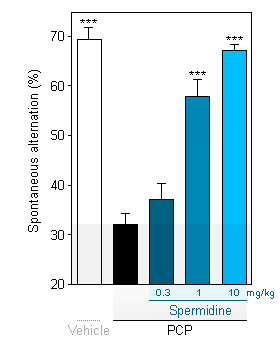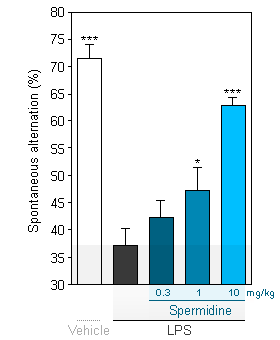From Molecular Mechanisms to a Clinical Impact on Cognitive Function
Newsletter # 106

Animal models
The preclinical data of Neurofit corroborate the mentioned clinical findings, demonstrating the positive impact of spermidine on cognitive deficits in mice induced either by NMDA hypofunction or inflammation.
1 https://doi.org/10.1001/jamanetworkopen.2022.13875
2
https://doi.org/10.1016/j.cortex.2018.09.014
-
Reversal of Phencyclidine (PCP)-induced cognitive deficit by spermidine
Left panel:
Phencyclidine (PCP) acts as an NMDA receptor antagonist, inducing symptoms akin to schizophrenia and cognitive impairment. Evidenced by reduced spontaneous alternations in mice (white vs black column), indicative of stereotypy, PCP leads to cognitive deficits. Spermidine administration demonstrates a dose-dependent improvement in spontaneous alternation performance in PCP-treated mice, enhancing cognitive ability (black vs blue columns). This supports the positive modulation of the NMDA pathway by spermidine.
-
Right panel:
The injection of LPS is recognized for initiating brain inflammation, resulting in a cognitive deficit and mimicking various pathological conditions. The LPS-induced cognitive deficit is apparent through a reduction in the spontaneous alternations of mice (white vs black column) reflecting repetitive insistence (stereotypy) on visiting the same arm of the T-maze. The administration of Spermidine shows a dose-dependent improvement in the spontaneous alternation performance in LPS-treated mice, enhancing their cognitive ability (black vs blue columns). This finding supports the idea that spermidine may interfere with inflammation.
Get in touch


 PREVIOUS
PREVIOUS

